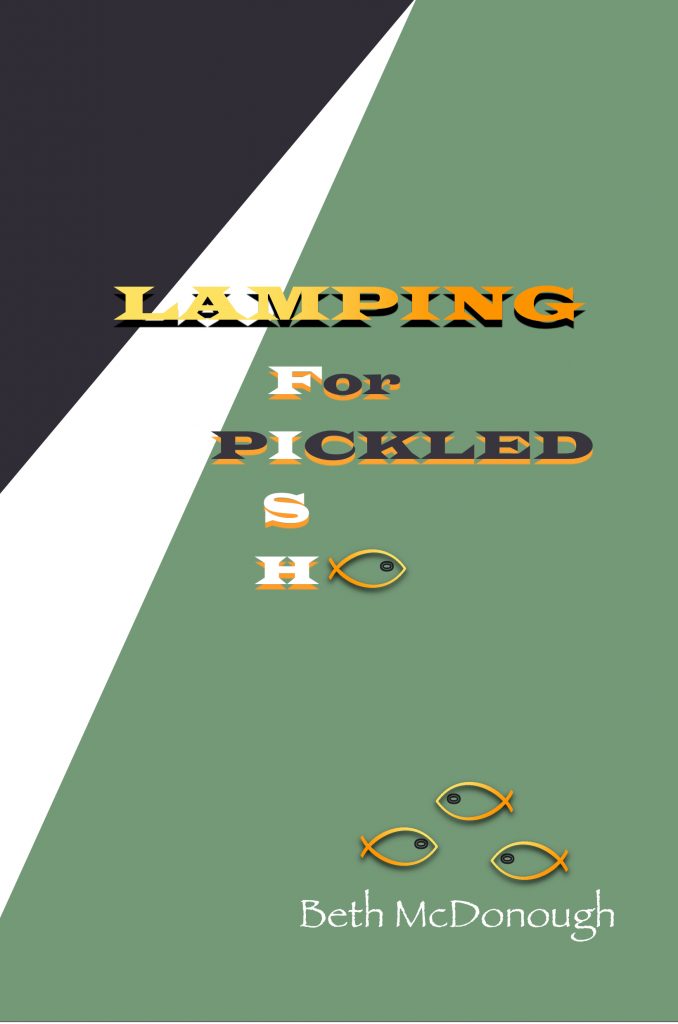Lamping for Pickled Fish
Beth McDonough
(4Word Press, 2019); pbk: £5.99
If there could ever be the right – the only – title for this poetry collection, then Lamping for Pickled Fish might be it, setting the reader up as it so neatly does for the illicit, for the hidden and obscure and for journeys into unexpected spaces.
This is Beth McDonough’s first solo pamphlet and it contains 29 poems, a few of which have been published elsewhere. In subject matter they divide roughly into three areas – the natural world, her travels in the Canary and Balearic Islands and family. Most of them are short, only a handful extending to a second page.
McDonough is a forager, avid in pursuit of the wild jewels of shoreline and hedgerow in her native north-east Scotland and a maker. A maker of jam, from Ronnie’s stolen rhubarb; of soused herring in the title poem; of a young adult from a toddler; and, effortlessly, of words from other words.
She works her language hard, pressing nouns and adjectives into service as verbs. In ‘Marmalade,’ where ‘fluff thickened pith’ places the poem firmly in the reader’s mouth, ‘juices loch onto boards,’ enabling an agile leap from the bitter zest of those Seville oranges, to sunshine in a Scottish winter. In ‘In all the wrong places II,’ doubling the function of parts of speech brings vigour and conviction to the tale of a frustrated gardener whose invasive Jerusalem artichokes never bloom. They invite reprisals, so she howks them up:
All ready to sturdy next year,
tasked to advance on the rasps.Then I angered them out.
And in so doing, finds their ‘gaseous promise’ underground. Where food is the vehicle, her poems are intensely physical. Eyes, fingers, mouth sticky with blood, juice, vinegar, sugar dust: the connection between body and harvest is profound, to be relished.
In ‘Peloton Mallorca, 2018’ there is real mirth (those cyclists with their ‘over-greasy bits’ ‘Venting over-shoulder shouts’) but the star of this Spanish group of poems is ‘Calima.’ Named for the hot, sand-laden wind which sweeps the Canaries in winter, it has a shifting, mesmerising beauty with its suffocating sibilance, its slowing down of time and coherent thought by the use of long, open vowels and plosive, stopping consonants:
There is no reliable map.
Watch this thinnest dust
ghost below doors[.]
The disorienting obscurity of a sunless sky deadens both instinct and understanding and she concludes, hesitantly:
if this lifts,
I’ll try to explain.
In Handfast, a pamphlet she published with Ruth Aylett in 2016, McDonough explored the subject of autism and its impact on her family. Here, in ‘How to hand-raise’ she returns to the subject, employing her early training in silver-smithing as an extended metaphor. In silver work, raising is a demanding sequence of practised actions in which a hollow vessel is created by persuading a sheet of precious metal into shape. But there is the infinitely less predictable raising of a precious child, where the discipline and security of rigorous training count for nothing and the road ahead is in darkness. There is kinship here with Henry Reed’s wartime poem, ‘Naming of Parts’, in which internal and external voices contrast controllable elements of life with emotions which will not be suppressed:
Work at a steady pace. Do not
attempt to compress your metal quickly or
[there is no even rhythm. Some weeks flame by in a million flaring
seconds sharped in sore bright sparks. Some crawl dungeoned into
eons. Nothing comes in measured lines]
your disc will surely crack[.]
This collection comes full circle and concludes where the next generation forager – a boy, his ‘legs/storking below that upper door’ – guddles for pickled fish in the night-time fridge of the title poem.
Beth McDonough’s work is sharp, spiky and humorous and it carries a real sense of the healing power of cauterisation. This is a deeply attractive publication.
Alison Bell


[…] Causeway, Gutter, and other publications. Her reviews appear in DURA and elsewhere. Her pamphlet Lamping for pickled fish was published by 4Word, and an earlier pamphlet Handfast was co-written with Ruth […]